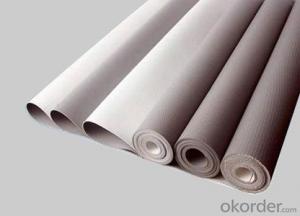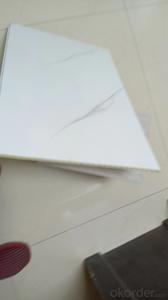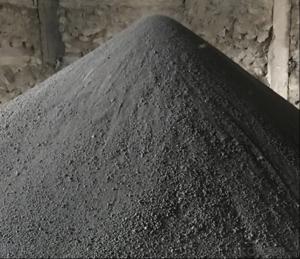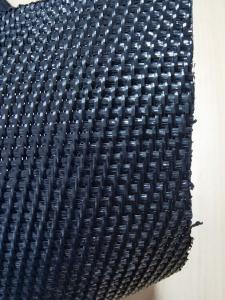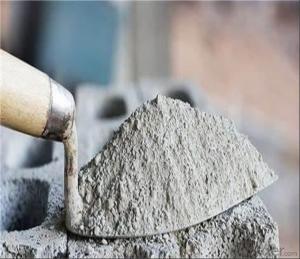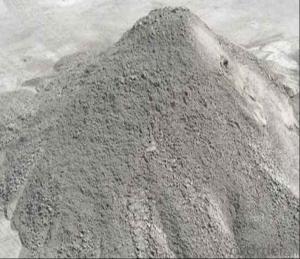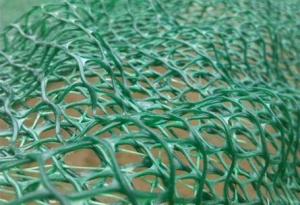Uniformity of polyvinyl chloride (PVC) waterproofing membrane
- Loading Port:
- China main port
- Payment Terms:
- TT OR LC
- Min Order Qty:
- 10000 m²
- Supply Capability:
- 300000 m²/month
OKorder Service Pledge
OKorder Financial Service
You Might Also Like
1.Structure of PVC Waterproofing Membrane Description:
Uniformity of polyvinyl chloride (PVC) waterproofing membrane is a kind of excellent high quality, high polymer waterproof material, PVC resin as the main raw material. The PVC resin and plasticizer, anti-uv agent, anti-aging agent, stabilizer, processing AIDS, molding of polymer waterproof coiled material is manufactured by extrusion method. The use of advanced equipment and advanced technology production made. This product with unique product formulations, waterproof materials, product life far beyond the general product has high tensile strength, elongation, shrinkage of small, low temperature flexibility and long life of the waterproof system, roof for more than 20 years, underground for more than 50 years, has been widely used in architecture, civil engineering, to adapt to the roofing construction ,underground engineering ,tunnel engineering and the application of special occasions, the product performance is stable, reliable quality, convenient construction.
2.Main Features of PVC Waterproofing Membrane:
Long service life, resistant to ageing
High tensile strength, elongation rate is high, the heat treatment small size change
Good root permeability resistance, good resistance to perforation
Construction is convenient, welding, firm and reliable environmental protection free from contamination
3.PVC Waterproofing Membrane Specification:
| Tensile Strength | ≥7.5 Mpa | |||
| Elongation at break | ≥450% | |||
| Tear strength | ≥25 KN/m | |||
Low temperature bending | ≤-40℃ | |||
4.PVC Waterproofing Membrane Images:
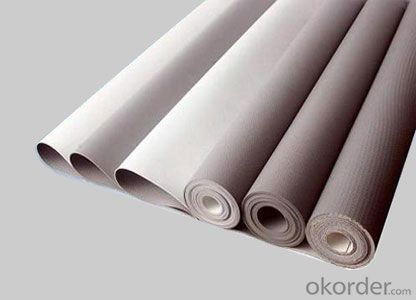
- Q:Are waterproofing membranes resistant to high temperatures?
- Yes, waterproofing membranes are typically designed to be resistant to high temperatures. They are made from materials such as modified bitumen, PVC, or EPDM that have excellent heat resistance properties, allowing them to withstand high temperatures without degrading or losing their waterproofing capabilities.
- Q:Can a waterproofing membrane be used on precast aluminum surfaces?
- Yes, a waterproofing membrane can be used on precast aluminum surfaces. Waterproofing membranes are designed to protect surfaces from water infiltration, including concrete, metal, and other materials. The membrane acts as a barrier, preventing water from seeping into the precast aluminum surface. This can be particularly beneficial in areas where moisture exposure is high, such as around swimming pools or in outdoor environments. It is important to choose a waterproofing membrane that is compatible with aluminum to ensure proper adhesion and long-term effectiveness.
- Q:Can a waterproofing membrane be used in renovation or retrofitting projects?
- Yes, a waterproofing membrane can definitely be used in renovation or retrofitting projects. In fact, it is often a critical component in such projects to ensure the long-term durability and protection of the building or structure. Waterproofing membranes are designed to create a barrier against moisture infiltration, preventing water damage, mold growth, and structural deterioration. During renovation or retrofitting, it is common to encounter issues like leaks, cracks, or deteriorated building materials that compromise the building's waterproofing system. In such cases, applying a waterproofing membrane over the affected areas can effectively seal and protect them from further damage. This can be done both on the interior and exterior of the building, depending on the specific requirements. Waterproofing membranes come in various forms, such as sheet membranes, liquid coatings, or spray-applied membranes. They can be applied to different surfaces like roofs, walls, basements, or even foundations. These membranes are flexible, durable, and resistant to water and other environmental stresses, making them ideal for renovation or retrofitting projects where there is a need to enhance the building's waterproofing capabilities. In conclusion, incorporating a waterproofing membrane in renovation or retrofitting projects is highly recommended to ensure the longevity and integrity of the building. It serves as a proactive measure to prevent future water damage, maintain structural stability, and improve the overall quality of the renovated or retrofitted space.
- Q:Can a waterproofing membrane be used for a balcony?
- Yes, a waterproofing membrane can be used for a balcony. A waterproofing membrane is designed to prevent water penetration and protect surfaces from moisture damage. Balconies are exposed to the elements and are prone to water damage, so applying a waterproofing membrane is essential to extend their lifespan and maintain their structural integrity. The membrane is applied to the balcony surface, creating a barrier that prevents water from seeping through cracks or joints. This helps to prevent water damage, such as leaks, mold, and deterioration of structural elements. It is important to select a high-quality waterproofing membrane that is suitable for outdoor use and can withstand exposure to UV rays, temperature changes, and foot traffic. A professional contractor should be consulted to ensure proper installation and to choose the right waterproofing system for your specific balcony needs.
- Q:Can a waterproofing membrane be used for a warehouse floor?
- No, a waterproofing membrane is not typically used for a warehouse floor. Instead, materials such as epoxy or concrete sealers are commonly used for warehouse floors to provide durability and resistance to heavy loads and foot traffic.
- Q:Can a waterproofing membrane be used for water fountains or decorative features?
- Yes, a waterproofing membrane can be used for water fountains or decorative features. It is designed to prevent water leakage and protect surfaces from water damage, making it an ideal choice for these applications.
- Q:Can a waterproofing membrane be applied on both interior and exterior surfaces of a structure?
- Both interior and exterior surfaces of a structure can receive the application of a waterproofing membrane. These membranes are designed to form a barrier that prevents water from infiltrating the structure. Regardless of whether it is applied internally or externally, the membrane serves the same purpose of keeping water out and safeguarding the structure against moisture damage. In the case of basements, crawl spaces, or other areas where water intrusion from the inside is a worry, interior waterproofing membranes are typically utilized. On the other hand, exterior waterproofing membranes are commonly used on foundation walls, below-grade areas, or building envelopes to stop water from seeping into the structure. It is crucial to select the appropriate type of waterproofing membrane based on the specific requirements and conditions of the structure.
- Q:Can a waterproofing membrane be used for a basement floor?
- A basement floor can indeed benefit from the use of a waterproofing membrane. These membranes are specifically engineered to halt the infiltration of water, safeguarding the underlying structure. When applied to the basement floor, the membrane acts as a barrier, effectively keeping the surface dry and shielding it from water damage. This is particularly crucial for basements, which are prone to water seepage due to their subterranean location. Furthermore, a waterproofing membrane also aids in curtailing the growth of mold and mildew, as it effectively seals out moisture. It is of utmost importance to select a top-notch waterproofing membrane that is explicitly designed for basement floors and to meticulously adhere to the manufacturer's instructions for proper installation.
- Q:Can a waterproofing membrane be used for a roof?
- Yes, a waterproofing membrane can be used for a roof. Waterproofing membranes are specifically designed to provide a barrier against water penetration, making them an ideal choice for protecting roofs from leaks and water damage. They are durable, flexible, and can be applied to various types of roofs, including flat and sloped surfaces.
- Q:Can a waterproofing membrane be used on drywall surfaces?
- No, a waterproofing membrane is typically not used on drywall surfaces. Drywall is not designed to be waterproof and would not provide a suitable substrate for the membrane.
1. Manufacturer Overview |
|
|---|---|
| Location | |
| Year Established | |
| Annual Output Value | |
| Main Markets | |
| Company Certifications | |
2. Manufacturer Certificates |
|
|---|---|
| a) Certification Name | |
| Range | |
| Reference | |
| Validity Period | |
3. Manufacturer Capability |
|
|---|---|
| a)Trade Capacity | |
| Nearest Port | |
| Export Percentage | |
| No.of Employees in Trade Department | |
| Language Spoken: | |
| b)Factory Information | |
| Factory Size: | |
| No. of Production Lines | |
| Contract Manufacturing | |
| Product Price Range | |
Send your message to us
Uniformity of polyvinyl chloride (PVC) waterproofing membrane
- Loading Port:
- China main port
- Payment Terms:
- TT OR LC
- Min Order Qty:
- 10000 m²
- Supply Capability:
- 300000 m²/month
OKorder Service Pledge
OKorder Financial Service
Similar products
New products
Hot products
Related keywords
